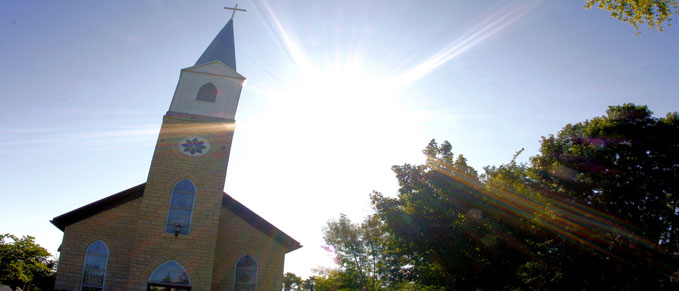by Megan Rohrer
When I became the executive director of the Welcome Ministry in San Francisco, I was a 21-year-old and in my second-semester of seminary from Sioux Falls, S.D.
I never expected to get the job, but my previous work with children in a residential home, my seminary background, and most of all, my black belt in Tae Kwon Do made the board think I was a good fit.
My first day, in June 2002, I went to our “Welcome Center”, which provides a light lunch and hospitality to the chronically homeless. That afternoon, someone pulled a knife in the kitchen.
One of the gray-haired church ladies rushed out of the kitchen saying “We need you in the kitchen; someone’s pulled a knife on Brenda.” Calvin, a six-foot-four man, stood in the kitchen with a fishing knife in his left hand. He was screaming at his transgender girlfriend, Brenda.
Having spent my earliest years around yelling and violence I wasn’t fazed by the disturbance in the kitchen. I simply walked up behind Calvin and put him in one of the holds I learned at the home for abused children we used when a child was having a violent tantrum. The hold was designed to ensure that the child wouldn’t be a threat to himself or anyone else. When I put Calvin in the hold, the knife fell out of his hand, and I promptly walked him out the front door of the church.
Streets are uneven when you’re down
 As soon as he was out on the sidewalk, his body relaxed. Because the hold he was wrapped in was also designed to be a hug, he fell into my arms exhausted and wept. He apologized and talked about how he was battling AIDS and didn’t think he could make it in the world without Brenda’s love and support.
As soon as he was out on the sidewalk, his body relaxed. Because the hold he was wrapped in was also designed to be a hug, he fell into my arms exhausted and wept. He apologized and talked about how he was battling AIDS and didn’t think he could make it in the world without Brenda’s love and support.
With a name like “Welcome Ministry,” it didn’t seem right to tell Calvin that he had to leave. So I told him that he could come back inside if he apologized to all of the volunteers, guests, and Brenda. Calvin agreed and tearfully apologized to everyone. He stayed and had a meal and even helped clean up.
However, because I had taken him outside so quickly, the whole incident happened too fast for many of the guests to really know what transpired. So in a couple days I learned that the other homeless people had been telling each other about how I had a black belt and that I had broken Calvin’s arm. Others said that I had put him in a coma and he was in the hospital for a week.
While none of these wild stories were true, they had spread so that people around town would ask me to be their body guard. There were no more fights at the Welcome Center for the next two years.
Radical welcome
When I look back on this story 10 years later, I see a model for radical welcome. Like any community, arguments sometimes happen. But when people are reminded that regardless of who was right or wrong, everyone needs to be welcome in our church space, it changes the way we resolve arguments.
This is the same welcome that Martin Luther envisioned in his concept of all people being simultaneously saints and sinners. Sometimes when I preside at a church service that begins with confession and forgiveness, I’ll remind those sitting in the pews that starting our worship off with forgiveness means that whatever we did, thought, or neglected to do, each of us has a clean slate. And for those who wonder how their slate compares to others, the act of communal confession and forgiveness helps declare our equal welcome to the service, to the communion table, and to give and receive love.
Apostle Paul declared it very beautifully, but we are forgetful people and need to be reminded again and again (every Sunday or perhaps more often) that our wealth, station in life, or ability to work does not define how God sees us or how we ought to see our neighbors.
Every day
 My story about Calvin is an extreme story of welcome. But it illustrates the fact that welcoming is something that is not limited to the first time that someone enters a church or a faith community. Welcome is something that must be done every day. It is a feeling that people have when they are together. It’s the way people articulate a community’s ability to honor and respect them, particularly when there is disagreement, diversity, or conflict.
My story about Calvin is an extreme story of welcome. But it illustrates the fact that welcoming is something that is not limited to the first time that someone enters a church or a faith community. Welcome is something that must be done every day. It is a feeling that people have when they are together. It’s the way people articulate a community’s ability to honor and respect them, particularly when there is disagreement, diversity, or conflict.
In our sainty-sinnerness, we are not people who are frozen in time. Tomorrow we may be able to welcome people we are unable to welcome today. We may be able to understand people we did not understand yesterday. If we have sharp edges that feel rough and hard to others, time can soften us like water transforms stone in the desert. The same is true for those who have been unable to welcome us in the past.
Like the journey to live more nonviolently, peacefully, or faithfully, living a life of welcome takes a lifetime. May God bless you in your efforts to welcome God’s diverse creation. May God strengthen you to continue to enter the doors of those who feel unwelcome. And when we fail to welcome each other, may we have the grace to shake the dust off our feet, to let go of the baggage, and to give each other opportunities to be transformed by the Holy Spirit, who works in her own time frame!
The Rev. Megan Rohrer is the executive director of the Welcome Ministry in San Francisco where Megan has worked with the chronically homeless since June of 2002. Megan is called by one Episcopal and four ELCA congregations. Megan preaches and teaches nationally and is a contributing blogger at LivingLutheran.com.

